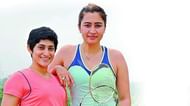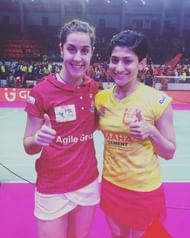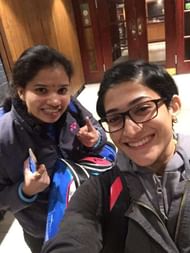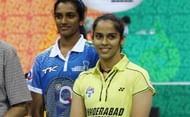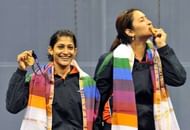“India, as a country, is reactive rather than proactive.”
Having won tournaments ever since joining the international circuit and still not getting enough support, Ashwini Ponnappa hits the nail on the head with this statement.
The gold at the 2010 Commonwealth Games in women’s doubles was supplemented by a mixed team silver. She and Jwala Gutta became the only Indian pair, and second Indians after Prakash Padukone in 1983, to win a medal at the World Championships, when they won the bronze at London in 2011. The 2015 Canada Open triumph came on the back of yet another successful CWG campaign in Glasgow and a bronze at the 2014 Asian Games.
Despite all these achievements, it wasn’t until September 2015 – less than a year before the Rio Olympics – that Jwala and Ashwini were included in the Target Olympic Podium (TOP) scheme. And that, too, came after a war of words and multiple requests and demands to the Sports Ministry.
“Not just the TOP scheme, a lot could have been handled way better, to be honest. I think when Jwala and I did well at the World Championships in 2011, things should have changed then,” the 27-year-old says. “When we did well in 2010 at the CWG, we should have had support, which would have eventually led to us, probably, doing well at the 2016 Olympics; not in 2012, where we lost out by just 1 point.”
“So when you see a pair having potential, who have done well, are doing well and have the potential to do even better, support them! Did anyone come forward to do that?” she questions. “They didn’t. And that’s why I think the delay in us being involved in the TOP scheme cost us a little bit (at the 2016 Olympics). The support we got was not enough to guarantee a medal.”
Looking at the likes of HS Prannoy, Guru Saidutt being part of the list already, it is natural that the country’s most successful doubles pairing would have been hurt at being overlooked time and again.
The badminton fraternity needs to stand up for doubles
This inevitably prompts the question whether doubles badminton gets step-motherly treatment as compared to singles. And just like she plays on the court, Ashwini doesn’t hold back here either, bluntly admitting that it is foolhardy to harbour expectations of a doubles Olympics medal when there is no significant backing.
“You see the companies that are supporting the junior players – all of them are supporting singles players, while nobody supports doubles players. Nobody wants to gamble on a doubles pairing and pick a pair and back them to win a medal, the way they would do for a singles player.”
“If you look at Saina and Sindhu, they have been given consistent support since the age of 13-14 and that’s what has helped them achieve everything at the international level. There’s not one doubles player who is given that backing.
“But you expect so much out of us when we are struggling, as it is. You can’t expect miracles at the Olympics as it is simply not going to happen with this backing,” she continues.
As I rewind the clock and try to remember the unrealistic expectations the nation had on the pair during the London and Rio Olympics, I have to agree with her. Just when my mind begins to wonder how they ever kept their motivation up, she explains:
“Everything that Jwala and I achieved; everything that Jwala-Diju achieved, what the other doubles players have achieved – is amazing. I think that’s remarkable. It’s an outstanding effort put by all of us; without having support, to just go there and play because you want to play and work hard for yourself, for your country.
“Of course, it stings when you don’t get any support, but it hasn’t stopped us from working and fighting and trying to do really well,” she says, almost as if she could read my mind and anticipate the next question.
“But to push us to the next level, we need more – a lot more – to make us get there, and that isn’t happening. We still believe that despite all that we are going to do well, but how far can belief alone take you? We need a lot of support.
“But hopefully, things (will) change. It hasn’t happened in the past though, despite Jwala and I performing well,” the anguish is quite palpable on her face as she talks about the seemingly unconquerable obstacles in her way.
No Indian pair goes into any Superseries, Olympics or Asian Games as one of the favourites. Any achievement by any Indian pair – and not just by Jwala and Ashwini – is considered a bonus.
It is evident that Ponnappa has been able to compete with the top nations and come out on top quite a few times despite the negligible funds and backing given to doubles badminton in India, rather than because of it. But that's not the only thing holding them back.
From parents failing to encourage their kids to take up doubles to the lack of media coverage, there are other factors too in addition to shortage of funds that have resulted in Indian doubles players merely making up the numbers at every tournament and playing second fiddle to the Far East and European countries. The problems are deep-rooted and many, which have resulted in India’s current lowly standing in doubles badminton.
“When we look at other countries, I feel, we are definitely capable of beating them. But at the same time, there’s a massive difference in the kind of facilities they are provided in terms of training and encouragement – which is most important at the grassroots level,” Ashwini says.
“The fans, as awesome as they are, can only feed what’s given to them – and that’s where the media plays a huge role. Unfortunately, there’s not a lot mentioned about doubles as opposed to singles.
“(With) the same performance between a singles player and a doubles player, the singles player would get definitely more. In terms of that, I feel doubles is not given any importance whatsoever. And that makes parents question whether they want to put their kid into doubles or let them continue there if he/she is put in doubles,” a realistic Ashwini confesses.
“As a parent, you are looking out for the well-being of the child. So you see how much a singles player gets and at the same time you see that a doubles player doesn’t get anything, it makes you question if you should let them continue doubles.
“I feel in that sense, India’s got a HUGE way to go to ensure doubles players get the respect, acknowledgement, and encouragement – which is there in the other Asian as well as European countries,” says Ashwini, for whom being pragmatic about the whole ordeal seems to come naturally. To be honest, if I was a doubles player like her, I would be seething at the system we’ve created.
“There are plenty of problems, but it all starts from the backing you have. You go to a tournament, we send 5-6 singles players, but just 1 doubles pair – that’s it. So how can we expect India to catch up when there’s a vast difference between that one pair and everyone else?”
Playing singles against Carolina Marin
After hearing the Cinderella-esque challenges that doubles badminton faces in India, I begin to ponder when it will get its Fairy Godmother it so badly requires. After an awkward silence, I look down at my list of questions as I seek to change the mood in the reception area of the Karnataka State Badminton Association facility – the venue of the interview – which has gone eerily sombre.
Suddenly my thoughts begin to move towards the Premier Badminton League (PBL), where Ashwini played an unexpected, yet delightful singles match against the reigning Olympic champion Carolina Marin. The Indian displayed an array of shots that surprised the Spaniard, and everyone else, as she took the first game 11-9. Although she went down 5-11 and 8-11 in the other two games, it was refreshing to see her step away from her comfort zone and give an excellent account of herself.
“Thank you so much,” she utters, flashing a smile when I mention that it was my favourite match of the 2017 PBL. “It (playing with Marin) was amazing, to be honest. That’s the best part about PBL – it gives you opportunities. In life you have things thrown at you and you have to grab them. And as I love playing singles despite being better at doubles, and not having played that format for a long time, I put my hand up to play against the Olympic gold medallist.”
Talking about the match, she explains how she prepared herself that led to winning the opening game against the then World No. 1. “I wanted to make sure that I play really well. Getting on the court, I just wanted to put up a fight and make sure I didn’t lose 11-0, 11-0 (grins as she recalls her mentality at the time).
“I just wanted to prepare well and I think it is part of being a professional badminton player that you don’t get into a match unprepared, irrespective of whether you’re training for it or not. So I decided I was going to prepare myself, watch how she plays, and it actually paid off,” she recalls.
The PBL has thrown up such challenges at players time and again, while giving them the opportunity to share the dressing room with the who’s-who of the badminton world. Although Ashwini never had an idol growing up, she had always been a keen observer of the game, trying to pick up things from each and every player. And that is precisely what she has been doing at the PBL as well.
When asked about how the league has helped her and other youngsters, the Bangalore-born shuttler is unequivocal in her praise of the tournament.
“The PBL has helped me a lot personally, and I am sure it has helped the others too. When I played the first edition of the IBL (the IBL was rechristened as the PBL after the first edition), I partnered Victor Fischer, who had won bronze in the Olympics and the World Championships. So I learnt A LOT!
“Being somebody who isn’t primarily a net player, and playing with someone like Fischer helped me immensely, and I partnered him in the second season too,” she fondly reminisces.
“Like I have learned a lot, I am sure the other Indians would have also learned by just watching them play, get ready, their preparations. These top players are very forthcoming with their opinions. They are happy to share and give you advice as well.”
Partnering with Sikki Reddy
In the 2017 edition of the PBL, Ashwini Ponnappa partnered Sikki Reddy for the Bengaluru Blasters. She had the former World No. 2 Korean pairing of Ko Sung-Hyun and Yoo Yeon-Seong to learn from – something she believes helped her climb one of the biggest learning curves in her illustrious career.
“In the last PBL, when Sikki and I partnered, the Koreans in our team were like coaches to us, and it was amazing how well we got to interact with them. They would guide us how to move and also give us drills.
“I learned a lot, and I am sure Sikki did as well, as they would point out the nitty-gritties (and) tell us what we were doing right and wrong, (stuff) that nobody generally tells you. But the fact that they did, was really helpful as we’re constantly learning,” the Bengaluru Blasters’ star doubles player says.
After the PBL, the unseeded pair of Ashwini and Sikki added another feather in their cap as they reached the final of the Syed Modi International. Despite leading in both games of the summit clash, they ended up on the losing side against the Danes, something which Ashwini believes would not happen if they were to get more consistent.
“I feel we still have to get more consistent. At the Syed Modi International, I feel we improved on the consistency bit. But as a pair, we haven’t had that many matches, so I think it would still take time,” confesses the 27-year-old.
“I am quite disappointed that we lost, irrespective of it being just our fourth tournament, because as a player you go to every tournament to win. And I truly believed we could have won and pulled it off. But we do tend to lose a couple of points in cases when we’re leading. So we’ll have to work on that and maintain a consistent lead,” she adds.
Unlike her previous partnership, where Ashwini did most of the running and Jwala did the attacking, we have seen Sikki and Ashwini share the court coverage workload and play as a more fluid unit, exchanging positions effortlessly. Their debut tournament was a second round exit, but they followed that up with a final in Wales, a semi-final appearance at Ireland and the final at the Syed Modi International.
When asked if the team dynamic was the reason behind the upward curve, Ashwini says that it could be one of the reasons, along with the fact that the two of them are “go-getters”. But she also plays down all their achievements so far.
She explains, “We’ve started with tournaments that we thought we could handle well as a pair. But as you go on to the bigger tournaments like the Superseries, it’s not going to be so easy.
“It’s good to start on a positive note, and that’s why we started off in the smaller tournaments – and the results in the first 3 tournaments gave us confidence. And now reaching the final at the Syed Modi, which is a big tournament, is a big deal for us. So that motivates us a lot.”
With the All England Championships coming up in March being their next major challenge, Ashwini feels that the duo will be ready for their first Superseries despite the stiff challenge posed by the presence of the Chinese and the Koreans.
The difference between Sikki and Jwala
A hyperactive child growing up and one who loved running out and playing till the sun went down, Ashwini never envisaged herself as a professional badminton player; she was ‘forced to pick up the sport’ as her parents thought it was a good way to keep her busy. However, once she got into the junior category, the bustling little girl began taking badminton seriously.
After spending a few years in the junior category, she was thrown into the deep end when, aged just 20 years, she was asked to partner a then 26-year-old Jwala Gutta. Their partnership lasted for six glorious years – a period she looks back on fondly, calling her former teammate a great mentor and partner.
“When I partnered with Jwala, I had zero experience. I started playing in the junior category and then moved to the seniors for a year and the next thing I know, I was partnering Jwala. So I believe Jwala had a lot of responsibility because we played in big tournaments.
“However, the good thing is that when I started playing with Jwala, we clicked instantly! She guided me a lot, was very supportive and was there for me every step of the way. She was always the one with experience and I was picking things up,” Ashwin says, giving a glowing tribute to her former partner.
Drawing parallels between Jwala in 2010 and Ashwini now, I ask her if she feels any added pressure to guide the 23-year-old Sikki Reddy. “Not at all,” comes the instant reply from her. “Sikki and I are, more or less, on the same page considering she already has a few years of experience under her belt, unlike me when I started out with Jwala.”
When quizzed about the future of the partnership, Ashwini takes a pragmatic approach while also hoping for a great partnership.
“We are two ambitious individuals who have gotten together. We are going to see how it goes. If it works, that’s great. If it doesn’t, well, that’s how life is,” she admits.
Saina or Sindhu?
Moving on to the biggest debate in Indian badminton was a no-brainer, but Ashwini, diplomatically, refuses to pick one out of Saina Nehwal or PV Sindhu, saying instead that they both have a long way to go.
Dealing with the debate in the same clever manner she deals with a tricky drop shot on the court, she says, “I feel the one that is more mentally tough and lasts there the longest will be considered the greater player. Sindhu is still young while Saina also has a few years ahead of her. Saina is very strong mentally and is extremely hard working while Sindhu has age on her side.
“When they both hang their boots, we may have Saina and Sindhu as 1-2, or it could be the other way around, you never know. Either way, it doesn’t matter as both of them are Indians at the end of the day.”
With the Saina-Sindhu debate going nowhere despite my repeated probing, I move on to ask her about her fitness mantra, which has helped her stay at the top of her game for so long.
“Currently, my fitness mantra is being smart. I’ve always been on the stronger side physically. When I started working on my fitness in December after a spell out, I took on a routine that was ‘my body specific’. Being a sportsperson, it is very important you only do stuff which helps your body and not everything, which ends up breaking your body.”
She talks about having to keep herself motivated to work out and keep her fitness levels up, specifically highlighting the efforts of her fitness trainer Deckline Leitao and Red Bull, who let her enjoy her exercise sessions with their unique ‘best fitness friend’ campaign.
“It’s nice I’ve found this new found love to enter the gym and go and work out. It’s been good,” says the Red Bull athlete.
Using social media as a motivating tool
Ashwini is one of the most accessible Indian sportspersons around, regularly using social media as a tool to communicate with her fans and loved ones – something she thinks the European players do extremely well. However, she has made her share of mistakes by over-sharing in the past, and says that she has been learning over the years.
“In the past, I had put out my e-mail address on social media, and I got a lot of mails. I was overwhelmed with all the love and replied to each of them. But I would get more replies and it became an endless cycle,” laughs Ashwini as she recalls her young, naïve self.
“Twitter helps that way. When I have time, I go there and answer questions of fans who I feel are genuine and want to know about me.
“I feel social media like Twitter and Facebook is a good way to let your fans know what you’re up to. It’s amazing the kind of support you get, especially when you’re down and things aren’t going your way. They give you messages like ‘It’s okay. We’re with you,’ etc. So it’s very motivating.’” she says.
“Being a public figure, it’s important you stand up for a cause”
Anyone who knows Ashwini Ponnappa is well aware of her love for animals. She has been an active PETA campaigner while constantly lending her voice and face for causes supporting animal rights. Being a public figure, she feels it is imperative that she supports a cause.
“For me, personally, I do it because I love animals. Being in the limelight, a celebrity, sportsperson or a public figure, it’s important you stand up for some cause – need not be animal rights, it could be the environment, supporting the girl child, old age homes, etc.
“I think that when you are in a place where you can make a difference and you can help out, I think you should do that,” professes the animal-lover, who herself has four adorable dogs at her parents’ house in Coorg.
Her biggest achievement?
A quick glance at my watch makes me realize that I have overshot my time by over 20 minutes – a period which has flown by as she has patiently answered each of my questions, keeping me entranced all the time. Trying to quench my never-ending thirst, I put forth a final question in front of her: ‘What would you say has been the biggest achievement of your career so far?’
“The best would definitely be the 2010 Gold at the CWG,” she answers immediately. “The next would be the bronze at the World Championships because it is, after all, the World Championships! And also because we were the first Indian pair to win it and the second after Prakash sir to win a medal there, so it was a huge deal.”
“However, the CWG is close to my heart as it was the first win for us (Ashwini and Jwala) and it was massive because it was in front of our own fans with everyone watching,” she reveals.
“It made a huge difference that we won it in India. If we had won it in 2014 in Glasgow and not in 2010, the impact wouldn’t have been the same and people probably wouldn’t have known who Jwala and I were.
“If it was somewhere else other than India, the newspapers would have carried it as (uses her hands to indicate a small heading at the bottom of the page) ‘Jwala and Ashwini won CWG gold’. While the same paper would have printed ‘Saina won CWG gold’ (gestures it to be a front page headline).”
With the kind of treatment meted out to doubles players despite all their achievements, I shudder as I think of the impact, or lack of it, that there would have been had the 2010 CWG been held outside India. But despite undoubtedly having had such thoughts cross her mind countless times, Ashwini continues with her charming smile as I thank her for her time.
She then glides out of the room to continue working ‘smart’ on her fitness in her quest to bring further laurels to the country.
